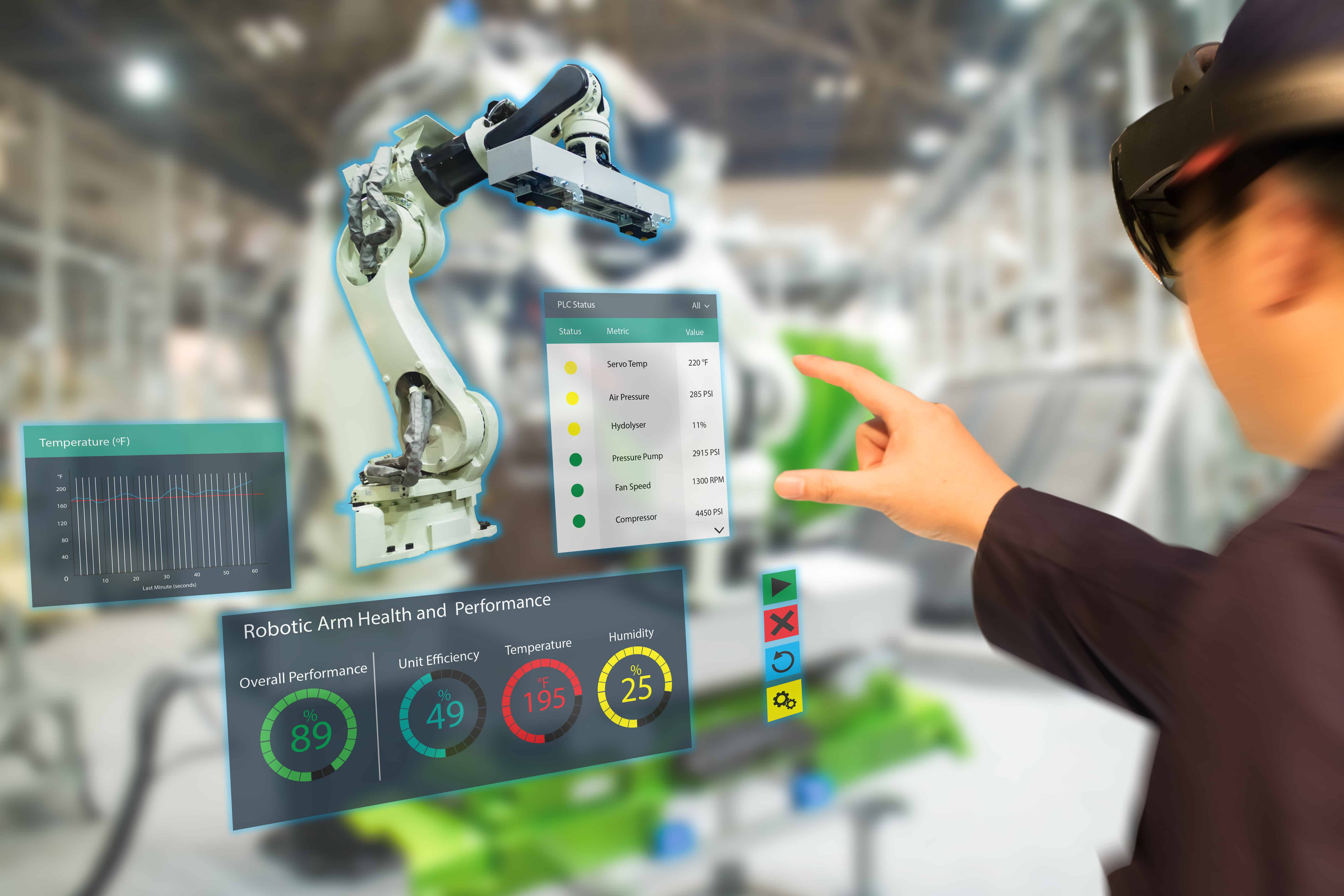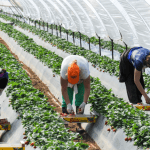Automate To Survive! Fourth Industrial Revolution Update – UK Manufacturing December 2018
 A leading figure in UK manufacturing has warned this week that the UK is trailing badly behind other industrialised nations in the Fourth Industrial Revolution (Industry 4.0)*. Tom Bouchier, Managing Director of industrial automation solutions, FANUC UK, issued a stark warning to the industry saying:
A leading figure in UK manufacturing has warned this week that the UK is trailing badly behind other industrialised nations in the Fourth Industrial Revolution (Industry 4.0)*. Tom Bouchier, Managing Director of industrial automation solutions, FANUC UK, issued a stark warning to the industry saying:
“Automate to survive! We need to grow UK manufacturing. As it stands, there are just 71 industrial robots per 10,000 workers in the UK. That positions the UK behind 14 other European countries and the only G7 country with a robot density below the world’s average of 73. The UK is outstripped by more than 20 countries in the global race for using robotics, with Korea, Singapore, Germany, Japan, Sweden, Denmark, the United States, Italy, Belgium and Taiwan leading the field. The UK is also beaten by Slovenia, Slovakia and Australia.
In contrast, Germany has 309 robots and as a result their workers are 36% more productive than the UK. We have to automate. Many UK manufacturers are still using traditional methods that are no longer viable. How do we get past this and really take advantage of the Fourth Industrial Revolution? Through the adoption of new technology, we can become more productive and start to close the gap between the UK and the leading nations. The UK has fantastic engineers and a great history in manufacturing, and now is the time to adopt a proactive approach.”
In the pharma manufacturing sector, GlaxoSmithKline (GSK) created a ‘factory of the future’ in Stevenage in 2018 to find improvements to current manufacturing processes using Industry 4.0 technologies. Recently GSK’s Industry 4.0 Director Patrick Hyett also warned: “If the industry wants to maintain control of manufacturing operations, it has to adopt digital technologies or face being ousted by the likes of Amazon. Employing Industry 4.0 technology is not about working towards future goals, but applying them now with a very deliberate purpose to reduce overall capital spend”.
In this blog, we take a look at recent developments by UK manufacturing to adopt new technologies to catch up with other countries in the Fourth Industrial Revolution (Industry 4.0).
£32m GKN Aerospace Global Technology Centre Opening 2020
- GKN Aerospace will open its Global Technology Centre (GTC) in Bristol in 2020. The Centre will focus on additive manufacturing, advanced composites, assembly and industry 4.0 processes
- The £32m facility will create 300 engineering jobs and serve as a base for GKN Aerospace’s technology partnership in the Airbus ‘Wing of Tomorrow’ programme and additive manufacturing programmes
- It will also include collaborative space for R&D with universities, the UK’s Catapult network, and GKN Aerospace’s UK supply chain including AMRC, Additive Industries, Ansys UK, Kuka Industries UK, the MTC, Materialise, the University of Bristol and the University of Sheffield
- Secretary of State for Business, Energy and Industrial Strategy, Greg Clark believes it will keep the UK at the forefront of manufacturing processes for the next-generation of aircraft: “As the sector moves towards a cleaner, greener and more efficient future, we are partnering with industry through our modern Industrial Strategy and new Aerospace Sector Deal to ensure we have the skills, innovation and supply-chain to continue our world leadership in aviation,”
- Hans Büthker, GKN Aerospace CEO said: “The GTC will ensure we continue to develop new technologies that deliver for our customers, making aircraft more sustainable and economical. It will also support our 4,000 strong workforce in the UK, ensuring they remain at the cutting edge of the global aerospace industry. The GTC is a great example of the UK’s industrial strategy at its best: with industry and the Government coming together to invest in the technology of the future.”
£24m Siemens Advanced Manufacturing Building (AMB)@ The University of Nottingham Opened December 2018
- Europe’s largest manufacturer, Siemens, opened the £24m research facility on Friday 7 December 2018 to accelerate advanced manufacturing technologies.With a total research portfolio of £80m, the development consolidates the University’s manufacturing science and technology capabilities, expertise and industrial support
- Juergen Maier, Chief Executive of Siemens UK, upon opening the AMB said:“Why is this important? It’s important because our future lies in driving a new technological revolution focusing on AI, automation, robotics, 3D printing. It will ensure graduates are at the cutting-edge and ready to take up the high productivity, high wage jobs of the future”
- Jake Berry, Member of Parliament for Rossendale and Darwen and Minister said: “This state-of-the-art facility will benefit Nottingham, the Midlands, and the whole UK economy by driving innovation, equipping people to secure highly skilled jobs and supporting manufacturing businesses of all sizes to thrive.
- The AMB houses University of Nottingham’s Institute for Advanced Manufacturing (IfAM).Professor Svetan Ratchev, Director of the IfAM said:
- “Skills challenges remain a key issue for many manufacturing businesses in the UK, due to factors such as the fast pace of technology development, an aging workforce and a shortage of graduates with relevant multidisciplinary skills and experience. The institute is helping to shape the manufacturing research agenda nationally and internationally and is supplying the technology and specialist skills to support key industrial sectors and encourage the growth of emerging industries”.
- The AMB follows the recent establishment of a new £27m, state-of-the-art manufacturing facility for Additive Manufacturing 3D printing by Siemens in Worcester in 2018
- The 3D printing business is expected to support the creation of around 55 high quality new jobs (engineers, metallurgists and manufacturing specialists) with the aim of making it a global centre of excellence within the Additive Manufacturing sector.
UK manufacturing companies however need to move swiftly on Industry 4.0 as there is already talk of Industry 5.0 on the horizon
- Industry 5.0 seizes the benefits of increased automation delivered as a result of the fourth industrial revolution and re-introduces humans back into the loop. Whereas Industry 4.0 setups are largely about consistency of quality and flow – replacing functions in which lesser-skilled people had to carry out repetitive, burdensome tasks – Industry 5.0 is about highly skilled people and robots working side-by-side to create individualised products, services and experiences. UK manufacturers need to be prepared to consider implementing significant changes to their production facilities now with Industry 4.0 technology if they don’t want to be left behind on the global manufacturing stage, before Industry 5.0 becomes the common buzzword and Industry 4.0 is long forgotten.
For Information Regarding Our Digital Skills Recruitment Services For Manufacturing Contact:
 Joanne Telfer
Joanne Telfer
Director
Ten Live Group
Award-Winning Global Manufacturing Recruitment Experts
Mob: ++44(0) 7547 761779
Email joanne@tenlivegroup.com
Skype: joanne.telfer4
Tel: ++44 (0) 1236 702007
SOURCES
*The Fourth Industrial Revolution (Industry 4.0) in manufacturing involves a combination of cyber-physical systems, automation and the Internet of Things (IoT) which together create a smart factory











